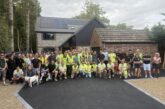
- New “Make it Visible” campaign sets to combat construction worker suicide, affecting up to two people per day, in partnership with The Lighthouse Construction Industry Charity and Balfour Beatty.
- “Higher-viz” vest will identify designated on-site support councillor at construction sites across the country.
- Campaign kicks off at this year’s Commercial Vehicle Show in Birmingham.
Ford has teamed up with the Lighthouse Construction Industry Charity to “Make it Visible” – a new high-visibility campaign using higher-viz safety vests to grab attention and point people in the direction of help when needed.
The UK’s commercial vehicle leader is stepping in to help combat the issue, with as many as two construction workers lost to suicide every day, according to the Office for National Statistics.
Despite extensive physical safety measures taken to protect on-site workers, construction workers in the UK and Ireland are taking their own lives, unaware of the help and support available.
Working with the Lighthouse Club, and construction contractors Balfour Beatty, Ford seeks to actively promote wellbeing awareness amongst its van customers. With Ford accounting for almost one in three new commercial vehicles sold throughout 2021 – and higher into the construction industry – putting mental safety on an equal footing with physical safety on building sites is an important step for this group of customers. By helping to make the support more visible, more workers will be able to seek assistance from available resources.
“This campaign is hugely important to Ford and highlights the importance of mental wellbeing alongside physical wellbeing on the construction site”, said Mandy Dean, director, commercial vehicles, Ford of Britain and Ireland. “As the UK’s best-selling commercial vehicle brand, it is likely the majority of construction workers are also Ford customers and operators, so we feel we have a duty to support them, through this partnership with the Lighthouse Club, raising awareness and getting support to those in need of it.”
The “Make it Visible” campaign follows on from Ford’s “Elephant in the Transit” launch from 2018, building awareness of male suicide and promoting the front seats of a vehicle as a safe space to talk.
This latest initiative sets out to provide counsellors a means to get to construction sites, with onsite posters matching the vest’s colours. These posters will direct workers to a safe place to talk off-site, so more can seek help easily.
Bill Hill, CEO of the Lighthouse Construction Industry Charity, said: “We are absolutely delighted to be partnering with Ford to deliver the “Make it Visible” campaign.
“These highly distinguishable vans will be visiting sites across the country to deliver visible support to the boots on the ground workforce. The vehicles are manned by the Lighthouse Club’s on-site team who are all Mental Health First Aiders with relatable experiences in the construction industry. I am convinced that this initiative will have a positive impact on workforce wellbeing and ultimately save lives.”
The “Make it Visible” campaign kicks off at this year’s Commercial Vehicle Show in Birmingham, supported by a fully liveried Transit Custom in matching high-visibility tones. In attendance on the Ford stand for launch day will be construction contractors, Balfour Beatty, a key supporter of the initiative, who were involved in piloting the scheme on one of their sites in London.
Heather Bryant, Health, Safety, Environment and Sustainability Director at Balfour Beatty, said: “For too long, the construction and infrastructure industry has treated mental health as the poor cousin of physical health. We must change this incredibly outdated perception – and at Balfour Beatty, we are continuing to lead the charge.
“The “Make it Visible” campaign helps to build on the work we have done with the charity Mates in Mind, by specifically helping us to reach those, including our valued supply chain partners, who may not be aware of the resources available to them whilst also providing a dedicated, safe space to talk.”







